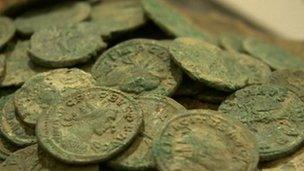Coroner rules on Roman coin hoard found at Bredon Hill
- Published

Worcester City Museum said it hoped to buy the hoard after a value had been set
Items from a Roman coin hoard uncovered in Worcestershire have been officially declared as treasure.
Metal detector enthusiasts Jethro Carpenter, 43, and Mark Gilmore, 47, discovered the hoard at Bredon Hill, near Evesham, on 18 June.
About 3,800 coins, dating back to the 3rd Century, were found in a clay pot.
They will now be valued by the Treasure Valuation Committee, but Mr Carpenter and Mr Gilmore can expect to receive a percentage.
The county's deputy coroner Marguerite Elcock made the ruling at an inquest in Stourport-on-Severn, on Wednesday.
Under the 1996 Treasure Act, items more than 300 years old and containing precious metals have to be declared.
'Turbulent time'
The coins are mainly bronze, with some silver content, and feature 16 different emperors, spanning 38 years.
Analysis suggests they were buried about 100 years later, in what experts have described as a turbulent time for Roman Britain.
The hoard, including the clay pot, will now be officially seized by the Crown.
The coins are on display at Worcester City Art Gallery and Museum until 26 November, after which they will be taken to the British Museum for valuation.
The museum said it hoped to buy the hoard after a price had been set.
Richard Henry, finds liaison officer for the Portable Antiquities Scheme, said: "The hoard is really exciting news for Worcestershire and we hope further investigations of the site will give us a better insight into this time period in the county."
The coins represent the largest hoard of Roman artefacts ever found in Worcestershire.
- Published21 October 2011